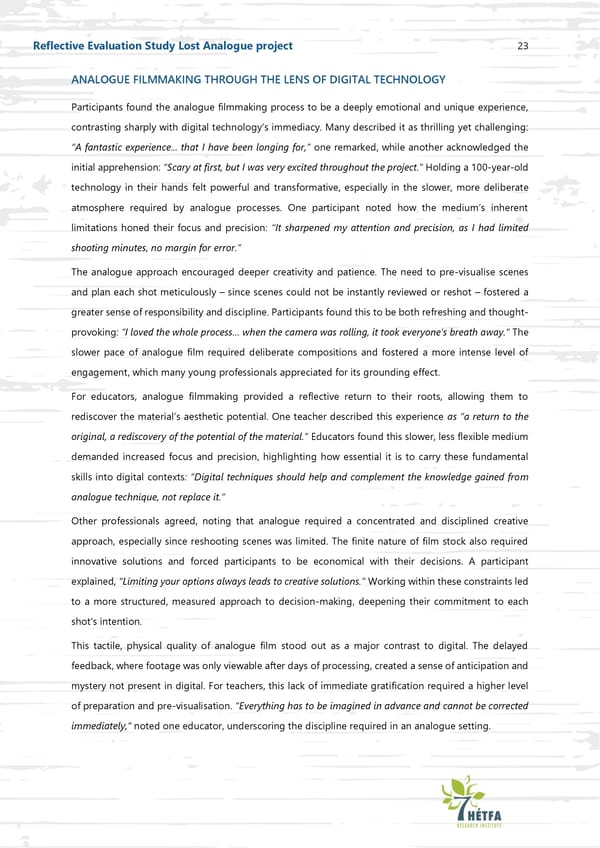23 Reflective Evaluation Study Lost Analogue project ANALOGUE FILMMAKING THROUGH THE LENS OF DIGITAL TECHNOLOGY Participants found the analogue filmmaking process to be a deeply emotional and unique experience, contrasting sharply with digital technologys immediacy. Many described it as thrilling yet challenging: A fantastic experience... that I have been longing for, one remarked, while another acknowledged the initial apprehension: Scary at first, but I was very excited throughout the project. Holding a 100 - year - old technology in their hands felt powerful and transformative, especially in the slower, more deli berate atmosphere required by analogue processes. One participant noted how the mediums inherent limitations honed their focus and precision: It sharpened my attention and precision, as I had limited shooting minutes, no margin for error. The analogue approach encouraged deeper creativity and patience. The need to pre - visualise scenes and plan each shot meticulously since scenes could not be instantly reviewed or reshot fostered a greater sense of responsibility and discipline. Particip ants found this to be both refreshing and thought - provoking: I loved the whole process... when the camera was rolling, it took everyones breath away. The slower pace of analogue film required deliberate compositions and fostered a more intense level of en gagement, which many young professionals appreciated for its grounding effect. For educators, analogue filmmaking provided a reflective return to their roots, allowing them to rediscover the materials aesthetic potential. One teacher described this experience as a return to the original, a rediscovery of the potential of the material. Educators found this slower, less flexible medium demanded increased focus and precision, highlighting how essential it is to carry these fundamental skills into digital contexts : Digital techniques should help and complement the knowledge gained fro m analogue technique, not replace it. Other professionals agreed, noting that analogue required a concentrated and disciplined creative approach, especially since reshooting scenes was limited. The finite nature of film stock also required innovative solutions and forced participants to be eco nomical with their decisions. A participant explained , Limiting your options always leads to creative solutions. Working within these constraints led to a more structured, measured approach to decision - making, deepening their commitment to each shots in tention. This tactile, physical quality of analogue film stood out as a major contrast to digital. The delayed feedback, where footage was only viewable after days of processing, created a sense of anticipation and mystery not present in digital. For teachers, this lack of immediate gratification required a higher level of preparation and pre - visualisation. Everything has to be imagined in advance and cannot be corrected immediately, noted one educator, underscoring the discipline required in an analogue setting.
 Celluloid Connections: Cultivating creative skills through analogue film and musical collaboration Page 23 Page 25
Celluloid Connections: Cultivating creative skills through analogue film and musical collaboration Page 23 Page 25